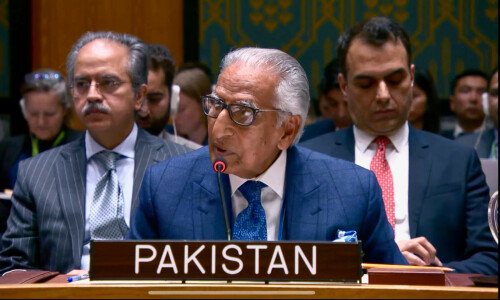KARACHI: The tertiary care hospitals in Karachi will have separate counters for internally displaced persons (IDPs) whose number in the province currently stands at over four million. A total of 62,000 patients are being treated daily for different diseases, including malaria, dengue, diarrhoea and gastroenteritis, at relief camps.
This information was shared during a meeting held between the minister for health and population welfare and the World Health Organisation’s representative in Pakistan on Thursday.
The meeting was held to discuss the ongoing flood relief in Sindh and the ways in which WHO could support the provincial health department.
Also in attendance were secretary of health Zulfiqar Shah and parliamentary secretary of health Qasim Siraj Soomro and WHO official Dr Sara Salman.
Formation of mobile health units stressed to reach far-flung areas
During the meeting, WHO representative Palitha Gunarathna Mahipala expressed concern over the calamity and said a disaster of this scale had not been seen before in the country and that the WHO would support Pakistan in this hour of need in all the ways possible.
Health Minister Dr Azra Pechuho shared her insights regarding the needs of the people for flood relief.
It was agreed during the meeting that mobile health units were needed the most as they could access populations that may have been cut off due to floodwater.
Dr Mahipala on behalf of his organisation offered 10 double-cabin vehicles and 10 regular vans that could be utilised as mobile health units.
Dr Azra Pechuho also expressed concern about the needs of pregnant women across the province and how they could be catered to.
She said that there would be a rise in chronic diseases like tuberculosis, hepatitis B and C, HIV and typhoid due to the contaminated environment.
Dr Pechuho suggested that a radio transmission was carried out regularly that could guide families about where to seek medical assistance and how to contact health officials in case of an emergency.
Registration of pregnant women, she said, would be helpful in enabling relief workers to know to prioritise specific treatments and supplements for the women who need it most.
Dr Mahipala accepted the health minister’s request for providing pregnancy kits with towels, diapers, nutrition supplements and material for menstrual hygiene support in flood relief assistance.
Dr Pechuho directed officials to utilise services of Covid-19 doctors in flood relief.
She also advised them to create makeshift hospitals with labour rooms and operating theatres in the tent cities that are being established to provide shelter to the IDPs.
It was also decided that there would be a daily online meeting with all the ministers who were taking account of the flood relief in Sindh in order to ascertain what the needs were and how the disease patterns were changing and what the priorities were for flood relief on a day-to-day basis.
There are currently 4,385,722 IDPs in Sindh, who are also being housed in labour colonies across the province.
Published in Dawn, September 2nd, 2022
















































